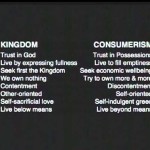We run our website the way we wished the whole internet worked: we provide high quality original content with no ads. We are funded solely by your direct support. Please consider supporting this project.
Living Jesus’ Prayer for Forgiveness
Luke 23:34: Jesus said, “Father, forgive them, for they do not know what they are doing.”
Could anything be more shocking and yet more beautiful than this prayer?
After being whipped, beaten, crowned with thorns, repeatedly mocked, spit upon, sneered at, and pierced with spikes through his wrists and ankles, while slowly suffocating as he hung on the cross, and as he was experiencing the nightmarish weight of the sin of the world upon him, Jesus assumes his tormentors are ignorant and prays for their forgiveness on this basis! When I recall that the one praying this is also the Creator of the universe, I am led to the conclusion that this is the single most shocking and single most beautiful sentence ever spoken in all of history. And it reveals the single most beautiful image of God in all of history.
If we let it, the beauty of this prayer, directed toward us (for our sin also put Christ on the cross) has the power to heal and transform us completely. But it also presents us with a breathtaking challenge – one we can only hope to fulfill as we’re transformed by the beauty of God’s grace.
We are repeatedly commanded in Scripture to follow the example of Jesus in all things (e.g. Jn 13:35; Eph 5:1-2; I Tim 1:16; 1 Pet 2:21, cf. I Cor 11:1). We are commanded to “have the same attitude of mind Christ Jesus had” (Phil 2:5, cf. I Cor 2:16). This means that the attitude Jesus revealed toward his enemies (including us) is the attitude we are to have toward our enemies, as well as to all other people. However heinous or threatening a person’s behavior may be, we are to assume that “they don’t know what they are doing.” And we’re to petition God for their forgiveness on this basis.
Nothing could possibly run more counter to the attitude that comes most natural to us in our fallen condition than the attitude Jesus reflected in his prayer. (This, undoubtedly, is one of the reasons the Lord gave us this example). In our fallen state, we most naturally replicate the original sin that pervades the rebellious human race. We “eat of the knowledge of the tree of good and evil,” which is to say, we put ourselves in a position of judging people. (For more on this, see my book Repenting of Religion).
In our fallen, rebellious state, we don’t instinctively assume the ignorance of others, especially if they are harming us. To the contrary, we usually assume their full responsibility and judge them accordingly. Moreover, instead of pleading for God to forgive them, we are more inclined to feel righteous as we plead with God to exact vengeance upon them. Our “natural” fallen response to our enemies is not at all reflective of God’s attitude toward us, as revealed in Jesus’ prayer on the cross.
I encourage all of us to strive to cultivate the mind of Christ, especially in this area of assuming the ignorance of others and praying for their forgiveness on this basis. Of course there are special occasions and relationships where it is appropriate and loving to assess the responsibility of others (though it’s never appropriate to make a negative judgment about another’s intrinsic worth). When serving as a juror in a court of law, for example, or when parenting a child, one needs to try to accurately assess the extent to which another knew what they were doing. But in all other circumstances, and with regard to all other people, we are commanded to imitate Jesus, including the attitude he reflected toward his enemies on the cross.
However heinous a person’s behavior may be, and however threatening a person’s behavior may be, we are to refrain from judgment, assume their ignorance and hope and plead for their forgiveness.
This is perhaps the most difficult act of discipleship we could ever engage in. Yet, this is a key to unlocking the beauty of the Kingdom in our life. Though it always gives the demonic illusion of empowerment, there is in reality nothing more life-negating than our judging impulse. As we by God’s grace learn to refrain from judgment and instead hope and believe the best in others (I Cor. 13:7) while praying for their forgiveness, the love of Christ is unleashed in our hearts. The beauty of Jesus’ prayer then begins to become a beautiful reality in our life. We experience a depth of joy and freedom that we otherwise would not experience.
I encourage us to cultivate the shockingly beautiful attitude of Christ on the cross. For Osama bin Laden and Mahmoud Ahmadinejad who threaten our nation; for the terrorists and soldiers who kill our sons and daughters as well as the predators who harm our children; for all those who do harm to us and our loved ones; let us strive to follow the beautiful example of Jesus and pray:
“Father, forgive them, they don’t know what they are doing.”
Category: General
Tags: Forgiveness, Judgement, Kingdom Living
Topics: Following Jesus
Related Reading

Sermon Clip: Brain Reign
In this short clip, Greg Boyd discusses the 3 parts to who we are to help understand the brains role. What does role does the mind, body, and spirit play in who we are? In the full sermon we look at the New Testament teaching on reigning over the relational brain. Understanding how God wired…

Guest Post: Culture War Neighbors by Bonnie Kristian
Matteo Parrini via Compfight The first time I was aware of meeting a gay person, I was 18. I took a summer job waiting tables, and it turned out two of my coworkers were attracted to people of the same sex. One, a waiter in his 40s, fit every stereotype on Will and Grace. The…

Lighten Up: Meet Rollins
Greg introduces his grandson Rollins and talks about the God of little things.

Little Pacifism
Richard Beck spoke about something he names Little Pacifism on his Experimental Theology website. It’s so easy, in the name of peacemaking, to become angry and aggressive. I suppose this is just part of what it means to be human. However, if we hope to bring the Kingdom of God closer the earth (and to…

Sermon Clip: Generic God
“Let’s all just get along.” Is this what God and religion are really about? All we have to do is just be good to people? Almost all religions can agree on this, but it is a generic view of God. In this clip from Greg’s latest sermon, he talks about this generic view of God…

Consumer Wars: Sermon Clip
To go along with our other post today, here’s a clip from Greg’s sermon last week. If you don’t have any financial margin in your life, this might have something to do with it. You can find the entire sermon here.
